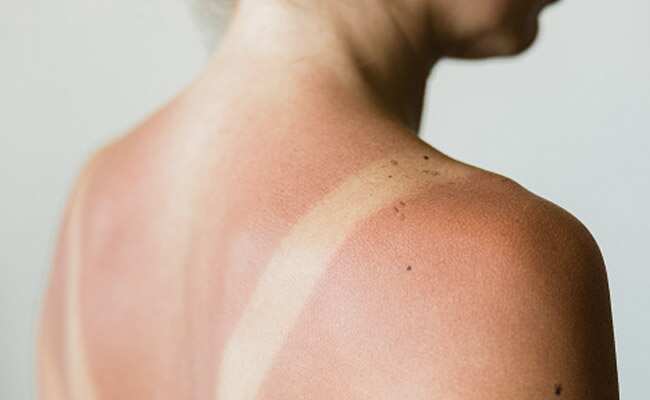UV radiation can also cause long-term damage to skin cells, leading to premature aging, wrinkles, and an increased risk of skin cancer.

Sunburns can occur quickly, even in as little as 15 minutes under intense sun exposure
Sunburns are a type of skin damage caused by prolonged exposure to ultraviolet (UV) radiation from the sun. They typically appear as red, painful, and sometimes itchy patches of skin that can begin to flake or peel within a few days. UV radiation is a type of light that is invisible to the human eye, but can cause damage to skin cells at the cellular level. When exposed to UV radiation, skin cells can become damaged or killed, leading to the visible symptoms of a sunburn.
The primary causes of sunburns are excessive exposure to UV radiation from the sun or other sources, such as tanning beds. It is important to note that even on cloudy or overcast days, up to 80% of the sun's UV radiation can still reach the earth's surface, putting individuals at risk for sunburns. Additionally, UV radiation can also reflect off surfaces such as water, sand, and snow, further increasing the risk of sunburns.
Sunburns occur when the skin has been exposed to too much ultraviolet (UV) radiation, most commonly from the sun. The skin becomes red, inflamed, and painful to the touch, and can result in blistering and peeling. Continue reading as we share tips to prevent and treat sunburns.
9 Tips to avoid and treat sunburns:
1. Apply sunscreen with at least SPF 30
Before heading out in the sun, make sure to apply sunscreen to all the exposed parts of your body. Choose a sunscreen with a minimum of SPF 30 that offers broad-spectrum protection against both UVA and UVB rays.
2. Wear protective clothing
Wearing protective clothing such as long-sleeved shirts, pants, and hats can greatly reduce the risk of getting sunburned. Clothing made of tightly woven fabrics provides better protection from the sun's harmful rays.
3. Avoid peak sun hours
Try to avoid going out during peak sun hours, which are typically between 10 a.m. and 4 p.m. during the summer months. If you must be outside, seek shade under trees, umbrellas, or other structures.
4. Stay hydrated
Drinking plenty of water can help keep your skin hydrated and reduce the risk of getting sunburned. Avoid dehydrating beverages such as coffee, tea, alcohol, and soda.
5. Use cool compresses
If you do get sunburned, use cool compresses or take a cool bath to help soothe the affected area. Avoid using hot water, which can further irritate the skin.
6. Take anti-inflammatory medications
Over-the-counter medications such as ibuprofen or aspirin can help reduce inflammation and relieve pain associated with sunburn.
7. Use aloe vera
Aloe vera gel or lotion can help soothe sunburned skin and promote healing. Apply a thin layer of aloe vera to the affected area several times a day.
8. Avoid tight clothing
Tight clothing can further irritate sunburned skin and make the pain worse. Wear loose-fitting, lightweight clothing that allows your skin to breathe.
9. Seek medical attention if necessary
If your sunburn is severe or if you experience fever, chills, or other signs of heat exhaustion, seek medical attention immediately. Severe sunburns can cause dehydration, blistering, and even infection, so it's important to take them seriously.
By following these tips, you can help prevent sunburns and protect your skin from long-term damage and skin cancer.
Disclaimer: This content including advice provides generic information only. It is in no way a substitute for a qualified medical opinion. Always consult a specialist or your own doctor for more information. NDTV does not claim responsibility for this information.
DoctorNDTV is the one stop site for all your health needs providing the most credible health information, health news and tips with expert advice on healthy living, diet plans, informative videos etc. You can get the most relevant and accurate info you need about health problems like diabetes, cancer, pregnancy, HIV and AIDS, weight loss and many other lifestyle diseases. We have a panel of over 350 experts who help us develop content by giving their valuable inputs and bringing to us the latest in the world of healthcare.














